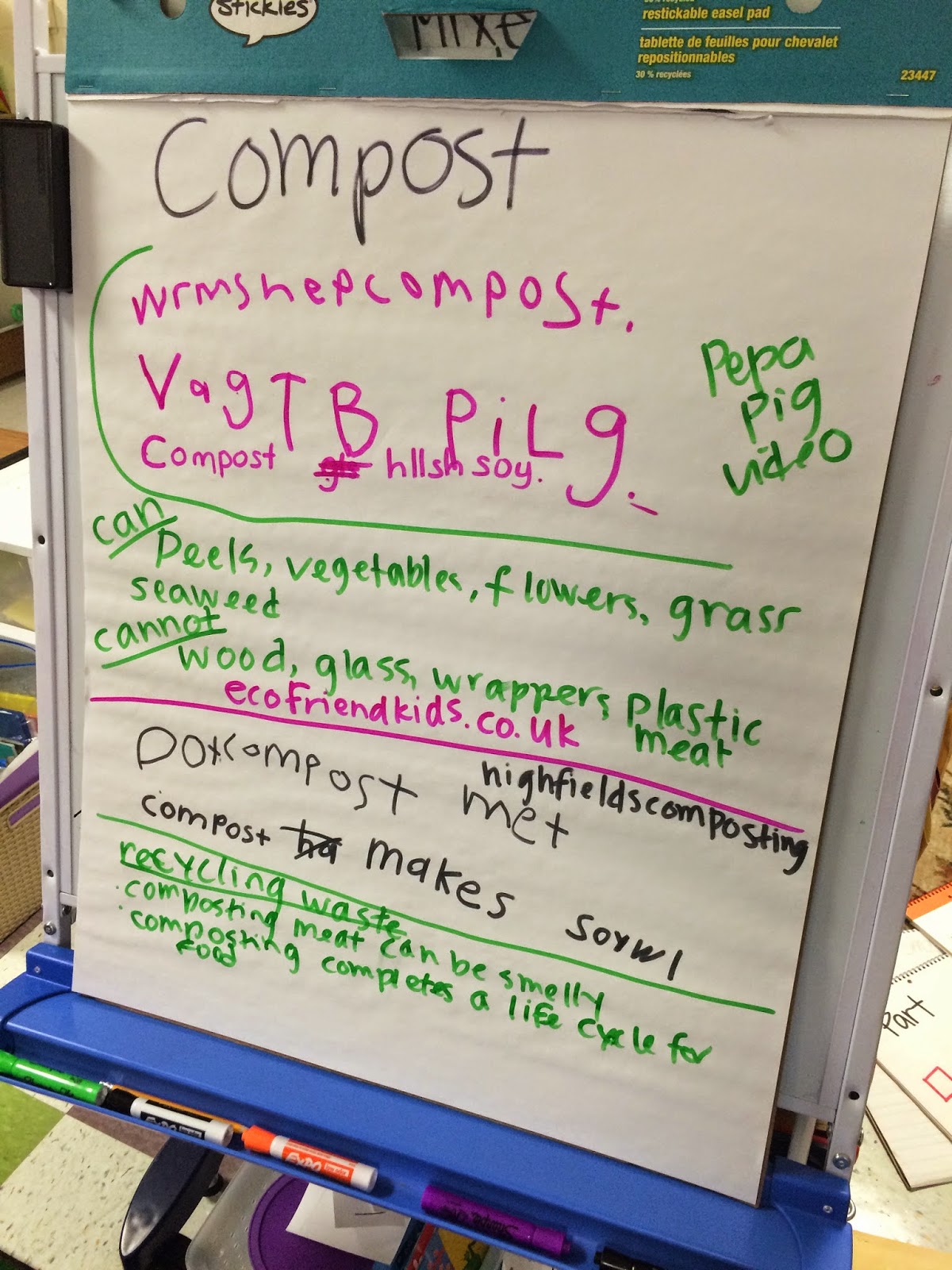we continued the conversation about food waste and composting, and I was REALLY hoping that someone would suggest we try composting....
Thankfully someone did! :)
So I told the kids that I didn't know too much about it, so we would spend some time researching it in the classroom to figure out how to do it! The kids had some basic background knowledge, thanks mostly to Peppa Pig's episode about composting. Another boy kept saying Worm
s, Worms.... (not going there quite yet!)
The night before I did a little online research to get started, but it was a process that we were really going to do together. In my mind, this was a going to be a "fun" day, off of our regular schedule. Little did I realize how this "fun" experience was really an authentic learning experience that allowed us to apply a lot of skills that we have been learning in the classroom. As I think back I probably could have planned out those moments better, but now I know and plan to do a lot more of this in the classroom!
We started the morning talking about how we research (CCSS W.1.7) We talked about how we could can use the internet or the library. We googled our question "How do you compost?" and started watching videos, reading some websites, and looking at images to find information (CCSS RI.1.6).
Then we wrote down some of our notes and findings:
Then we took a trip to our library. There we talked about where we should look for our books about composting--in the Fiction or Non Fiction section. The kids all shouted out nonfiction because we needed real books and ones that give information. (CCSS RL.1.5) That was good for my heart to hear that all those conversations about fiction vs. non-fiction were helping them apply it when they needed it! Then we learned more about the dewey decimal system and went in search of some books!
When we got back to classroom, I told the kids that I didn't want to read the whole book to see if it talked about composting and wondered what I should use to figure it out... That of course led us to nonfiction text features! (CCSS RI.1.5) I students suggested I look at the table of contents, but when that didn't give us enough information, i suggested we look a the index. That was a feature they had trouble understanding the purpose of, but after this experience, they definitely understand how that will help us! If the book didn't have either feature, we did a quick picture glance to find out the info.
Then we started focusing on the recipe for composting and we found out we needed some browns and greens. The kids got a little confused when thinking that the object did not have to be brown or green to count as that kind of material, but they worked in groups to make a list of some things they could start collecting.
We collected food scraps from breakfast and lunch over the next couple days. We also gathered pine straw and dead leaves from outside.
I found this resource that was helpful to me in figuring out how to do this small scale (classroom bin instead of an outside one). We do have a composter bin at school, but I am not ready to go large scale yet.
Friday we made the compost recipe!
We did a little bit more brown materials-- I read that it would help the smell not be so overwhelming. Every couple of days we need to stir it up a bit. I have no idea how it will turn out and really hope that it doesn't invite a lot of bugs into the classroom this weekend, but it was a great learning experience!! I am excited to see how this helps us change our thinking about food waste over the year. Once challenge is the fact that we are collecting a lot of the same types of food, so that can affect the balance.
If anyone is an expert in composting and wants to share some advice, we would love to learn more!
I'm excited to incorporate more authentic learning experiences into our weeks. It is so important to help the kids see why what they learn is important and they were all so engaged I did not have to have some of the behavior conversations that I normally did!
I'm curious to find out on Monday what kind of conversations they will have with their families about the experience. In the days we have been focusing on food waste, I have been a lot more conscious of all the compostable materials I am throwing away! We are never too old to keep learning and reflecting!












No comments:
Post a Comment
Comments or Questions?